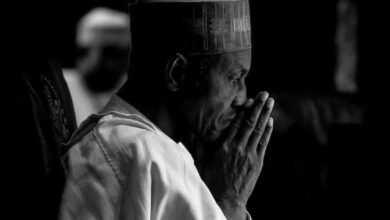Memories of the month of Ramadan

By Muhammad Ajah
When I was young, my friends and I used to be full of enthusiasm whenever the month of Ramadan approached. It was not actually because of the understood importance of the month or the spiritual rewards derivable from it. Who, then, cared much about what Ramadan really meant in the life of a Muslim? All we knew was that it was a month of fasting, eating early in the morning and breaking it at sunset. All we knew was that it used to come with a lot of goodies in terms of eating assorted menus and many uniquely interesting events. O Innocence! And we did it with our believing parents, brothers and sisters in Islam.

Although with my background as a Muslim from the minority, we fasted the month with faith but without caring about the rewards. We were more attracted to this great Islam obligation because of the atmosphere that always permeated the society from the beginning of Ramadan to its end. Unlike before and after Ramadan, the spirit of eating together to fast before Fajr prayers and break the fast together by sunset was overwhelming. The spirit of sharing was overpowering. And the spirit of giving was irresistible. During the period, it was difficult to specially differentiate between who has what to eat and who does not have. Muslims cooperated like one family.
Families would cook and bring to the Mosque. The poor had free access to the homes of the rich. The poor tasted the food of the rich or even fed with them. The rich would make time to chat with Muslims around and make great efforts to alleviate as much burdens as possible from the weak. And so the atmosphere remains until the Eid-Fitr is celebrated. And so it remains for few more days after Ramadan, a celebration during which the spirit of faith, love and brotherhood thickly saturate the air. And we always wished Ramadan should not end. O Innocence!
If wishes were all real, I would wish to remain in that stage to enjoy Ramadan to the full, to enjoy Ramadan without any slight worries and to enjoy Ramadan without fear or pressure. One would wish to be so, free from the life struggles to provide for one’s needs, for the immediate and extended families and for the underprivileged in the society. These struggles sometimes become overweighing to the extent that the sweetness in observing this great obligation becomes less and therefore, disproportionally felt. One goes to work immediately after the Fajr prayers and comes back home late due to the heavy traffic experienced in the cities. Like William Shakespeare said, we are wasting our powers in search of worldly things that are sordid. This is an everlasting reminder from Shakespeare: “The world is too much with us, late and soon; Getting and spending, we lay waste our powers; Little we see in Nature that is ours; We have given our hearts away, a sordid boon!”
I writhe in anger when I try to compare my memories of Ramadan in the past and the present. Yet, I am soothed by the words of Allah SWT that He is in control of our lives and has made temptations part of the lives of believers. The chases in life have made many Muslim lose taste of the divinity in Ramadan, the only month that was called in the Holy Qur’an with its name by Allah and the only month that has a night greater than 83 years. Are we ready to make amends and try our best? Yes, we can do it.
Islam does not allow laziness at any time, including the period of Ramadan. Every time is precious in the life of a Muslim. That is why Allah swore with Time in the Holy Qur’an. Apart from the natural fixation of time for certain occurrences, there is time for every Islamic obligation and activity. So, under whatever circumstance a Muslim should not mix-up the time for every action. There should be no compromise for the time to perform spiritual activities. In the same way, there should be no compromise for the time to discharge duties through which legitimate livelihood is earned. Except for excuses accepted officially by one’s employer, a Muslim should not take Ramadan as an excuse to be inactive or abscond from duty. Rather, a Muslim can take an annual leave if there is the feeling of performing religious duties unsatisfactorily during the holy month.
However and under whatever circumstance, a Muslim should strive harder to attain the greatest aim of the month which is piety. Piety is not attained with laziness, pretence or fanaticism – overzealousness. It is attained by the regular observations of Allah’s commandments. Piety is the greatest level of faith because it makes a Muslim to be conscious all the time of the Presence of Allah. It makes a Muslim to build his/her life in accordance with the dictates of the Holy Qur’an. It makes a Muslim to be contented with the little available provision from Allah. And finally, it makes a Muslim to be ever ready for his/her journey day – death.
If piety is demanded of a believer at all times, it is much more required in the month of Ramadan. That is why Allah started and ended the discussion on fasting Ramadan with it. The first verse that discussed fasting is Q2:183 which reads: “Oh you who believe! Fasting is prescribed to you as it was prescribed to those before you, that you may attain (taqwa) piety and righteousness”. The last verse is Q2:187 which reads: “… Thus does Allah make His Signs clear to mankind that they may attain piety (taqwa)”. And in Q49:13 Allah decrees: “The most honoured by Allah amongst you are those best in taqwa.”
During Ramadan, the consciousness of a believer of the Presence of Allah should multiply. Observing the obligatory prayers on time and the supplementary including Tarawih should be of great interest; keeping away from filthy actions openly and secretly should be paramount; reading/learning/teaching the Holy Qur’an should be a daily affair and sharing/helping the poor and needy should become of serious interest. The feeling of the Presence of Allah should summarily awaken the uprightness of a Muslim and inspire in him/her the strong belief in Allah’s bounty, mercy and pardon.
The believer should remodel his/her life to fit with the commandments of Allah in the Holy Qur’an and the teachings of Prophet Muhammad (SWA). The sweet memory of the narration of Aisha (may Allah be pleased with her) that the life of the Prophet was the Holy Qur’an is impressive. There is nothing about human life – both religious and circular – that is missing in the in Holy Qur’an. The life of our noble Prophet remains the best model for us. It is confirmed by Allah Himself in the Qur’an.
In addition, there is no amount of provision bestowed on man by Allah that can satisfy man. According to authentic narrations from the tradition of the Prophet, two persons who hardly get satisfied are seeker of knowledge and seeker of wealth. Ultimately, nothing satisfies man, nothing can quench the ever strong desire of man to acquire wealth except the soil – death. In short, the question that often seeks answer is: How much can a man have to stop him from seeking more? So, contentedness with whatever provision Allah avails should be of courage to a Muslim. To attain this laudable quality, a Muslim should not always look at those who are more favourded by Allah; rather he/she should always remember and consider his/her position above millions of people around the vicinities. That will spur him/her to be prayerful and hopeful in Allah for a better condition. Assuredly, no condition is permanent and Allah’s Time and Providence are the best.
By that, he/she should share and give out from the little provision during Ramadan. And indubitably the preparation for death should be an all time concern. Death is a timelessly timely visitor. It is definitely true that some people prepared for Ramadan but died in the wee hours of the beginning. Some are blessed to witness it but may die before it ends. Remembrance of death at all times will eliminate or reduce the penchant of a Muslim towards evil and enhance the love for doing good. So, a Muslim must maximally utilize any opportunity in life for the service of Allah and humanity which is the primary reason for his creation and for being alive. Purity of intention for Ramadan and putting in the best effort in doing good and forsaking bad can be an assured source of attaining Allah’s happiness in this life and the hereafter.
Therefore, fasting Ramadan should not be for mere merriment or showoff. Every action of man is given manifold reward, up to seven hundred times. But Allah SWT said in a Hadith narrated by Bukhari: “…Except for fasting, for it is for Me and I will give recompense for it, he leaves off his desires and his food for Me.’ for the fasting person there are two times of joy; a time when he breaks his fast and a time of joy when he meets his Lord, and the smell coming from the mouth of the fasting person is better with Allah than the smell of musk.”
The Paradise is awaiting those who fast the month of Ramadan. Paradise is the home of honour, dignity, eternal rest, beauty, peace, joy and satisfaction. It is here again for those who want all these goodies. Ramadan Kareem and may Allah accept all our deeds in it. Ameen.
*Muhammad Ajah is an advocate of humanity, peace and good governance in Abuja. E-mail mobahawwah@yahoo.co.uk.









